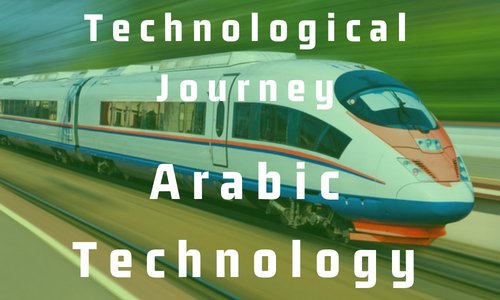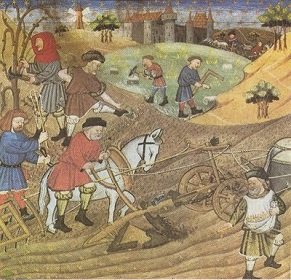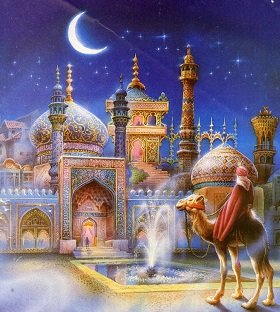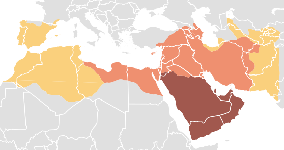Science began to be applied to the field of agriculture and a new concept was introduced in the way of organizing land: private property. All these factors helped to have surplus production, which greatly favored trade and exports.
The consequence of this change is the Islamic golden age, which would be the technological "revolution" of this agricultural expansion. Due to the "globalization" of that time, there were great developments in that culture, illustrious engineers and scientists were born and lived there, such as Ismail al-Jazari, Alhacén, Jabir ibn Hayyan, Avicena or Taqi ad-Din, which left their discoveries for eternity.
You could even say that the Islamic world of that time was the "West", since while Europe was mired in some ignorance, it was in Baghdad or Mecca where Aristotle was read –which is not necessarily positive– and other philosophers of all over the world, the Muslim empire was the intellectual center of the globe.
Mathematics is developed to solve concrete problems in their society; inheritances, commerce, construction, in this way advances in areas such as trigonometry or algorithms, number theory and, new disciplines are created such as combinatorial and algebra.

This civilization achieved wonders in its mosques with the help of mathematics. From left to right: 1. Roof of Shiaraz, Iran. 2. Cubic equations of Omar Khayyám. 3. Geometric patterns, Green Mosque, Turkey. 4. Algebra by Ben Musa. 5. Ceiling of the Wazir Khan Mosque, Pakistan.
Among their inventions and contributions we can highlight: improved paper, openness to liberal and individualist ideas, the astrolabe was improved and became universal, alembic, crankshaft, algebra, valve, piston, crystallization, public libraries, universities, hospitals, crop rotation and manufacturing complexes (Tiraz). It should be noted that in the Arab world of that time, women had great participation in public life and homosexuality was tolerated –at least in the aristocracy–.

From left to right: 1. Astrolabe. 2. Alembic. 3. Animation of six-cylinder water pump - Taqi al-Din. 4. Illustration of a water lift - al-Jazari. 5. al-Razi, chemist.
His contributions were in all areas, both civil and military; they improved the Chinese gunpowder, catapults, cannons, created a torpedo, it is even said that they designed the first rockets and created fireproof clothes. They copied all kinds of Hellenistic and Roman machines, improving many of them, the principle of the two-stroke engine was developed and, above all, various hydraulic machines, such as water pumps, were built.
Also, important works were left for engineering, philosophy and medicine –among others–, such as the Book of Ingenious Mechanisms, attributed to the Banu Musa brothers –persians–, the Book of Knowledge of Ingenious Mechanisms, written by Al Jazarí –kurdish–, On how to achieve the happiness of Al-Farabi –turkish– and The canon of Medicine written by Ibn Sina (Avicenna).

From left to right: 1. Double suction pump - Al Jazarí. 2. Physicists using a surgical method. 3. Water Elevator - Al Jazarí. 4. Banu Musa brothers lamp. 5. Book of Al Jazarí. 6. Vertical windmill - al-Dimashqi.
However, why did not they continue to develop? There are various theories, the invasion of Mongols or internal conflicts, but the least known - and most consistent - is: by religion. There was a man, Hamid al-Gazali (1058 BC - 1111 BC), who would be the equivalent of St. Angust in Christianity, he said what the interpretation of the Qur'an should be.
One of his statements was that the manipulation of numbers was Satan's work, as you might imagine, this stopped all subsequent mathematical developments. He also attacked the philosophers of his time very much –he wrote a book entitled: The Incoherence of the Philosophers– as philosophy was closely linked to the study of science, the decline of these began.
There were people who wanted to confront this current of thought, but failed, such is the case of Averroes (Ibn Rushd), which proposed the independence of thought in the face of religious dogmas, ended up executed and his works incinerated.
Although some say that it was not al-Gazali responsible for the Islamic stalemate, but he promoted critical thinking, instead, blame a contemporary of his: Nizam al-Mulk (Hassan al-Tusi), however, the cause is the Same: religion.
In contrast to antiquity, the technological developments achieved during the Arab Golden Age were not forgotten. They were taken to Europe –because the empire was the educational capital of the world, the scholars were going to learn there–, the works were translated, the inventions were improved, therefore, we can conclude that this "revolution" was vital for the later.
For that reason, the most important thing about this golden age is that it allowed the dissemination of knowledge from different places on the globe.

So far today's trip, I hope you liked it, in future chapters we will analyze what happened in Europe in those years, was there really a technological setback? Did not innovate in any way?
Ancient Revolutions || Technological Journey #1
Arabic technology || Technological Journey #2
Dark Europe? || Technological Journey #3
Industrial Revolutions || Technological Journey #4
Current Technological Revolution || Technological Journey #5



Greetings.
In case you want to communicate with me, do it by Discord: @julioccorderoc#9500
Author: @JulioCCorderoC
The texts and images where it is not specified otherwise, are my property.
The separating bar is the detail of a mosaic in Alhambra, which served as inspiration for M. C. Escher. Source.


Esta obra está bajo una Licencia Creative Commons Atribución-NoComercial-CompartirIgual 4.0 Internacional.

This work, belongs only and exclusively to my authorship. Under The Digital Millenium Copyright Act Of 1998.
© 2018 All rights reserved. steemit.com/@julioccorderoc | Terms & Conditions of Use | Privacy Policy

















This post has been selected by Altruistic as a post of the day has been given an upvote.
You can join us on her discord server: https://discord.gg/KHB9eJk to know more about what we do and how we can be of help. To earn more curation reward, you can follow our trail on steemauto.com or streemian.com.
Please kindly upvote this comment in order to keep us helping plankton and minnows that their quality posts are undervalued.
#altruistic-steem
Thank you!
Congratulations! This post has been upvoted from the communal account, @minnowsupport, by julioccorderoc from the Minnow Support Project. It's a witness project run by aggroed, ausbitbank, teamsteem, theprophet0, someguy123, neoxian, followbtcnews, and netuoso. The goal is to help Steemit grow by supporting Minnows. Please find us at the Peace, Abundance, and Liberty Network (PALnet) Discord Channel. It's a completely public and open space to all members of the Steemit community who voluntarily choose to be there.
If you would like to delegate to the Minnow Support Project you can do so by clicking on the following links: 50SP, 100SP, 250SP, 500SP, 1000SP, 5000SP.
Be sure to leave at least 50SP undelegated on your account.
Congratulations! this post got an upvote by @steemrepo and was manually picked by the curator @veryspider to be added on STEEM REPOSITORY, simply comment "YES" and we upload it on STEEM REPO Website.
Want to know more about the Steem Repo project? Contact us on Discord
YES!
well written and well researched article ! very good read :> it's amazing that a lot of our math comes from arabic roots :>
I'm very happy that you liked my content. Yes, I did a lot of research to make it quality. Their culture discovered many things, but more than Arabs, the authors were Islamic (remember that most of the people with more scientific prestige were Persians, Kurds or Hispanics). Greetings.
CONGRATULATIONES.
Jajajaja, siempre he querido decir eso.
Well done @julioccorderoc! You successfully guessed the match result.
Click on the badge to view your Board of Honor.
Do you want to know your current ranking? Read this post
Do not miss the last post from @steemitboard:
SteemitBoard World Cup Contest - Quarter Finals - Day 1
Do you like the SteemitBoard World Cup Contest?
Vote for @steemitboard as a witness and get one more award!
Congratulations! This excellent post was chosen by the new curation initiative of the @postpromoter content promotion service to receive a free upvote!
This post exemplifies the type of great content that we at @postpromoter enjoy reading and would love to see more of on the Steem platform. Keep up the good work!
Thank you so much:)
This post has just received lots of ♡♡♡#LOVE♡♡♡ and a 50.00% upvote from @haveaheart!
Thank you for your thoughtfulness in choosing this service.
@haveaheart donates 10% of all received profit to the Sri Sathya Sai Heart Hospital
Click here to make a difference
Delegate to haveaheart and support a charity that really cares.
Daily payouts for delegators are 85%.
(Be sure to leave at least enough SP undelegated that your account is still usable.)
I appreciate your support, greetings!
You got a 12.01% upvote from @postpromoter courtesy of @postcurator!
Want to promote your posts too? Check out the Steem Bot Tracker website for more info. If you would like to support the development of @postpromoter and the bot tracker please vote for @yabapmatt for witness!
Thank you!